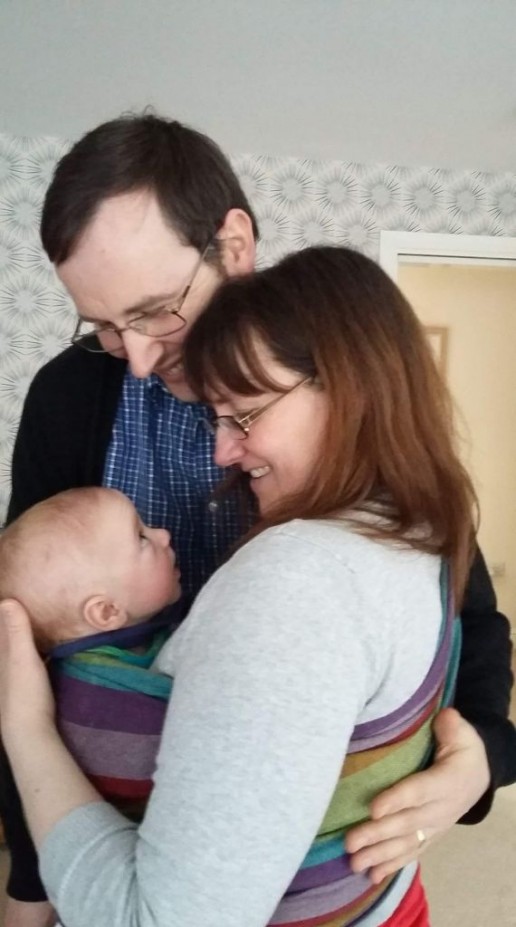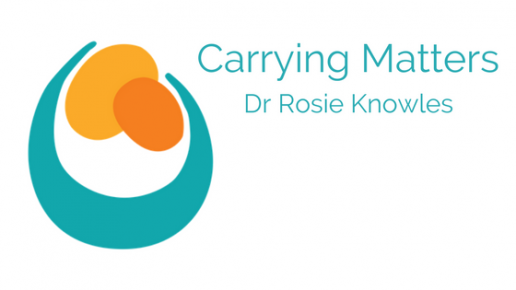Carrying children can be of enormous therapeutic benefit to parents. Ruth experienced antenatal depression, which took her by great surprise; it affected how she felt about herself and her growing baby. She was fortunate enough to receive prompt care from the services around her, but it wasn't until her baby arrived that finally things began to improve. Using a sling played a huge part in her recovery.
Antenatal depression is much less recognised than the better known PND (postnatal depression) but is equally important to identify and treat. There’s a growing body of research that suggests that prolonged maternal stress in pregnancy has an effect on the developing baby (whereas short intermittent episodes don’t).
“A secure bond between the mother and child after the birth can neutralize negative effects of stress during pregnancy.” Stress, 2017
Depression in pregnancy can also have an impact on the growing baby, so early recognition and treatment is important.
“Attention to maternal health during pregnancy is an extremely high priority for society for many reasons … the good news is that this risk might be reduced by systematic screening of pregnant women for depression and initiating effective treatment. Biological Psychiatry, 2013
Here is an useful PDF from the NCT if you feel concerned that you may feel anxious or depressed during your pregnancy: please seek support!
Here Ruth’s story.
Until 19 weeks pregnancy (my first) went pretty well. No morning sickness, not a single day off work despite fertility treatment, no complications unless you count some pretty bad indigestion. We had been on holiday, made plans to see friends, and life carried on pretty much as normal. The media told me that I should be glowing, feeling the wonder of a little life growing inside of me, and connecting with my baby. Friends asked constantly how the baby was doing, what I was going to call it, if I knew what I was having, had I chosen any names.
However my work situation had deteriorated, support was lacking, and I just was not coping with doing my job. Once incident left me lying on the floor in the changing rooms sobbing my heart out for an hour. Sent home sick, I managed to get a GP appointment. He quickly identified me as suffering from a “depressive episode”, and made an immediate referral to the Perinatal Midwife at my maternity unit.
I had never heard the term Antenatal Depression before, despite being a health care professional myself. Nobody I had every met had suffered from it. It was to take over the remainder of my pregnancy.
The next weeks passed in a bit of a blur. I sobbed the whole way through our 20 weeks scan. I sobbed through a dental hygienist appointment. I sobbed through an appointment with an obstetrician who carried on as if nothing was happening. Apart from appointments I sat in the house, claiming I was watching Wimbledon on the TV, or sleeping. I couldn’t face going to the supermarket. I ducked out of plans with others. I sobbed through telephone counselling appointments arranged by my work. At a “wellness” meeting with my manager I was so upset she was reluctant to let me drive home as she thought I would crash.
I didn’t care. Although I could see my bump growing I struggled to believe that I was actually pregnant. I was a fraud. I didn’t deserve to be a mum. The pregnancy was a mistake, what was I thinking?! I told my husband I was going to leave him with the baby as soon as it was born. In fact, there was no need for me to be around at all. I was a horrible person, and I was better off not in this world. If the baby had a quiet day and wasn’t kicking I didn’t care. I couldn’t go in to the nursery. I felt massive amounts of guilt that I didn’t love my baby. I felt so alone and isolated, and told very people what was going on as I felt judged.
And yet I had the insight to know that I was not myself. I was very fortunate that a new Perinatal Mental Health team had been set up in my area, and I was referred and seen very quickly. The care and support I got from them, my midwives and GPs was to probably save my life. They supported me through the rest of my pregnancy, which was further complicated by anaemia and gestational diabetes. And my husband was amazing, supporting me emotionally, eating the same meals as me, and reassuring my that I was beautiful even when I felt like a hippo.
Baby M has not had the most straight forward start in life, having spent his first three nights of life in the Neonatal Intensive Care Unit, and suffers from severe reflux. And yet, I love him. It was not that big rush of love that some people tell you about, it was a more gradual process. Even the day after he was born I felt the fog of depression lifting.
So what does this have to do with carrying? M and I went to our local sling library when we was a few weeks old and we started using a stretchy wrap. At first I saw it as a tool to free up my hands and get on with things… and then I realised that holding M close to me helped me feel better. It made him cry less, and even when he was crying it was less shrill. I looked him in the eye, spoke to him and involved him in making decisions – kind of! We danced and swayed, I pulled funny faces in the mirror, and learned to interpret his cues. I describe carrying M in a stretchy as being like a big long cuddle without your arms getting tired. I felt that bond that I never felt while he was in my womb. I was a mother at last. We were connected.
Carrying M has also helped in other ways. My husband has a sling now, and seeing them together warms my heart and helps us feel like a true family. Carrying enables us to keep him upright after feeds, reducing his reflux. We are able to get out and about more easily, which has helped us to cope with life as new parents. M is at eye level so strangers engage, and talk to him and us where they wouldn’t if he was in a pram. The slings acts as a great ice breaker with other parents. I have recently trained as a Peer Supporter, and now help at the local sling library, meeting other babies and parents each week, increasing my confidence.
I strongly believe that carrying my son, together with the support of my healthcare team and family, has helped my recovery from antenatal depression and to prevent post-natal depression, which I was at high risk of developing. When discussing my pregnancy I now feel able to l able to discuss my experience and hope that it will become more widely recognised.
Ruth now volunteers at Wirral Sling Library helping other families to carry their own children safely and well.

You can read more about how carrying can help in perinatal mental health disorders here.

